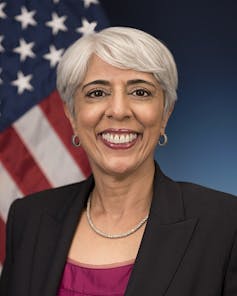
Pexels
I Was a Presidential Science Adviser – Here Are the Many Challenges Arati Prabhakar Faces as She Takes Over President Biden’s Science Policy Office
The director of the Office of Science and Technology Policy plays a critical role in achieving the president’s science goals. Facilitating cooperation among the dozens of research agencies is key.
Arati Prabhakar has been sworn in as director of the Office of Science and Technology Policy and assistant to the president for science and technology after being confirmed by the U.S. Senate, two months following her nomination by President Joe Biden. As the director of OSTP and assistant to the president, she now serves as the confidential science adviser to the president and is also accountable to Congress. Prabhakar is both the first woman and first person of color to hold this role.
I had the pleasure of getting to know Prabhakar during the Clinton administration when she was the director of the National Institute for Standards and Technology and I was director of the National Science Foundation. In 1998, President Bill Clinton selected me to be his director of OSTP and assistant to the president for science and technology, a position I held until the end of the administration in 2001.
These positions at the National Science Foundation and Office of Science Technology and Policy gave me different perspectives on how the federal government carries out its multiple complicated roles supporting science and technology, as well as a sense of some of the challenges Prabhakar faces. By focusing on cooperation among federal agencies and the White House offices in addressing the president’s goals, she can help ensure that the U.S. science and technology enterprise rises to the many difficulties the country faces today.
Eyes on innovation
Born in India, Prabhakar immigrated to the U.S. in the 1960s, obtained a doctorate in applied physics from the California Institute of Technology and has had a distinguished career in both government and industry. She has held leadership positions in several technology and venture capital companies. Her most recent federal appointment was as director of the Defense Advanced Project Agency, or DARPA, under Barack Obama.
Today, the U.S. faces a number of existential challenges ranging from climate change to future pandemics, to competition from China, to social inequality – all of which will require harnessing the power of science, technology and innovation. In Prabhakar’s Senate testimony, she described how the OSTP is the only place in the federal government that focuses on the overall health and global standing of U.S. science and technology capability. The full spectrum of exploration, discovery and implementation fall under her purview – from very basic, fundamental research to putting technological innovations into the market.
Biden shares this belief in the vital role of science and innovation, as does Congress. The recently passed the bipartisan CHIPS and Science Act promotes general research and development and semiconductor manufacturing capability, specifically as a response to the rapid rise of Chinese science, technology and innovation.
Collaboration is critical

No single U.S. executive department or agency alone can accomplish the president’s goals. The U.S. system is enormously complicated; a multitude of agencies support research and development, as well as applications of science and technology. For example, many departments and agencies were instrumental in developing and launching the internet, which many people might take for granted today.
Science agencies interact with dozens of White House offices. OSTP must work well with all these agencies and offices of the White House, a place where effectiveness depends on establishing a balance between assertiveness and cooperation with other players.
A big challenge for Prabhakar – and an issue on the minds of many leaders in science and technology – will be assisting and coordinating the efforts of many research agencies to achieve national goals while protecting and strengthening their traditional roles in supporting basic research in science and engineering. This will require earning the trust and respect of the heads of the various agencies and her colleagues in the White House and making sure her voice is heard in order to achieve the goals laid out by the president and Congress.
Balancing basic research with applications
I very much agree with Prabhakar that the U.S. could benefit greatly from investments in both fundamental research as well as in technology development, but trade-offs will inevitably be made within that broad scope of federal responsibilities.
There is growing concern within the research community that, given the recent focus of Congress and the Biden administration on innovation and the translation of scientific discoveries into real-world applications, fundamental research is likely to lose support. Many worry this could harm the United States’ long-standing supremacy in science.
Prabhakar has devoted her career to creating solutions from the scientific advances that come from basic research done in universities, national laboratories and in industry. She is well aware that sound judgment, teamwork and a degree of assertiveness will be needed to advance the president’s research, development and innovation initiatives while ensuring policymakers do not neglect fundamental research.
How to be effective
With so many players involved, cooperation is key.
As OSTP director, Prabhakar has the task of facilitating effective cooperation among the many federal scientific, health and regulatory agencies. Cooperation among federal agencies and companies, particularly in areas of new technologies, is critically important for accelerating the pace of translation of discoveries to applications, but that has consistently been hard to manage.
The OSTP director can also play an important role in facilitating the relationships between industry and government, and there are currently both a commitment and substantial funding from both sides to support this goal. The CHIPS and Science Act calls for the government to invest US$10 billion to create 20 new “regional technology and innovation hubs” in locations that are not currently centers of technology. I believe Prabhakar’s experience in DARPA, the National Institute of Standards and Technology and the private sector will allow her to deftly promote cooperation.
Another particularly important challenge every OSTP director faces is in helping prepare the annual budget request. The budget consists of thousands of lines disbursing funding for executive departments and agencies. While the Office of Management and Budget plays the lead role in this process, the director of OSTP is expected to work with the director of the OMB and many other White House advisers to ensure that the president’s priorities in science and technology are addressed.
Since the president’s initiatives will involve many federal agencies, pulling together all the necessary information for the budget is going to be particularly challenging and will require considerable cooperation between agencies. It is critical that Prabhakar develop a close working relationship with the OMB to make sure the agencies get what they need.
The U.S. is facing huge challenges – from pandemics to climate change to competition with China – that all require massive national efforts in science and technology. Arati Prabhakar has devoted her career to advancing U.S. innovation and competitiveness in science and technology. I believe she will do an excellent job in her new role. A final attribute she brings to the table is the fact that, as an immigrant, she sets an example for the thousands of women and men coming to the U.S. to study science, engineering and technology. It is vitally important that the U.S. continue to be a magnet for talent from all over the world.
![]()
This article is republished from The Conversation under a Creative Commons license. Read the original article.






